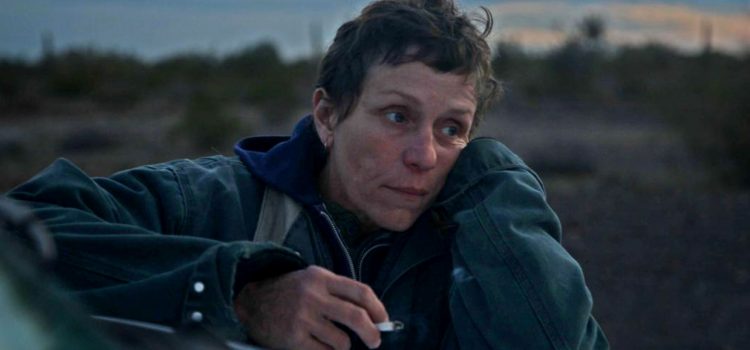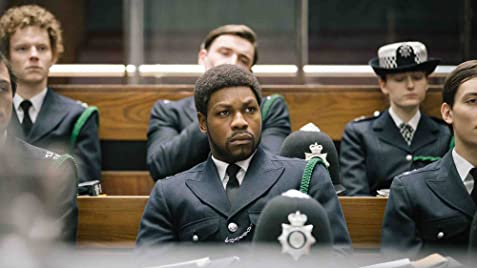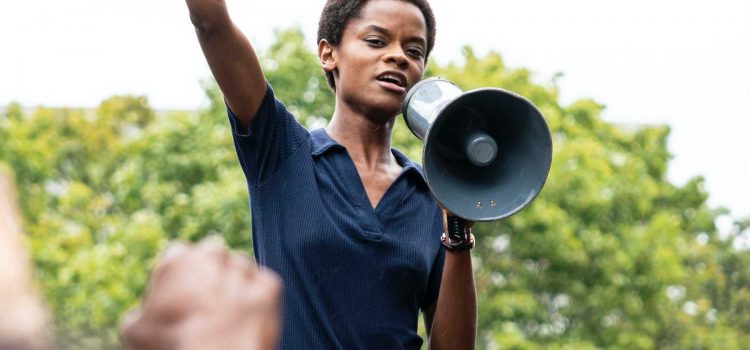The Critics Choice Association (CCA) announced the winners of the 26th annual Critics Choice Awards LIVE on The CW during an in-person/virtual hybrid ceremony hosted for the third time by acclaimed film, television, and stage star Taye Diggs on Sunday, March 4. The full list of winners can be found below.
“Nomadland” led the winners in the film categories, taking home four awards including Best Picture, Best Director and Best Adapted Screenplay for Chloé Zhao, and Best Cinematography for Joshua James Richards. Zhao is the first Chinese woman to win as either director or writer.
“Ma Rainey’s Black Bottom” followed closely behind, winning three categories including Best Actor for the late Chadwick Boseman, Best Costume Design, and Best Hair and Makeup. Best Actress was awarded to Carey Mulligan for “Promising Young Woman,” which also earned a Best Original Screenplay win for Emerald Fennell. Best Supporting Actor went to Daniel Kaluuya for “Judas and the Black Messiah,” and Best Supporting Actress to Maria Bakalova for “Borat Subsequent Moviefilm.”
In the series categories, “The Crown” took four categories, the most of the night, winning Best Drama Series, Best Actor in a Drama Series for Josh O’Connor, Best Actress in a Drama Series for Emma Corrin, and Best Supporting Actress in a Drama Series for Gillian Anderson. In the comedy genre, “Ted Lasso” won all three categories for which it was nominated: Best Comedy Series, Best Actor in a Comedy Series for Jason Sudeikis, and Best Supporting Actress in a Comedy Series for Hannah Waddingham. “The Queen’s Gambit” took the prize for Best Limited Series, and its leading lady Anya Taylor-Joy won Best Actress in a Limited Series or Movie Made for Television.
The race for “Best Comedy Special,” which was dominated entirely by Netflix nominees, resulted in a tie between “Jerry Seinfeld: 23 Hours to Kill” and “Michelle Buteau: Welcome to Buteaupia.”
As was previously announced, John David Washington presented this year’s SeeHer Award to his “Malcolm & Marie” co-star, Zendaya. The SeeHer Award recognizes a woman who embodies the values set forth by the SeeHer movement, to push boundaries, defy stereotypes and acknowledge the importance of authentic portrayals of women across the entertainment landscape.
After leading the nominations, Netflix also won the most awards of any studio/network with a total of 14. Amazon Studios and Searchlight Pictures each won four.
Critics Choice Awards are bestowed annually to honor the finest in cinematic and television achievement. Historically, they are the most accurate predictor of Academy Award nominations.
The 26th annual Critics Choice Awards show was produced by Bob Bain Productions and Berlin Entertainment. The CCA is represented by Dan Black of Greenberg Traurig.
Follow the 26th annual Critics Choice Awards on Twitter and Instagram @CriticsChoice and on Facebook/CriticsChoiceAwards. Join the conversation using #CriticsChoice and #CriticsChoiceAwards.
FILM CATEGORIES
BEST PICTURE
Nomadland (Searchlight Pictures)
BEST ACTOR
Chadwick Boseman – Ma Rainey’s Black Bottom (Netflix)
BEST ACTRESS
Carey Mulligan – Promising Young Woman (Focus Features)
BEST SUPPORTING ACTOR
Daniel Kaluuya – Judas and the Black Messiah (Warner Bros.)
BEST SUPPORTING ACTRESS
Maria Bakalova – Borat Subsequent Moviefilm (Amazon Studios)
BEST YOUNG ACTOR/ACTRESS
Alan Kim – Minari (A24)
BEST ACTING ENSEMBLE
The Trial of the Chicago 7 (Netflix)
BEST DIRECTOR
Chloé Zhao – Nomadland (Searchlight Pictures)
BEST ORIGINAL SCREENPLAY
Emerald Fennell – Promising Young Woman (Focus Features)
BEST ADAPTED SCREENPLAY
Chloé Zhao – Nomadland (Searchlight Pictures)
BEST CINEMATOGRAPHY
Joshua James Richards – Nomadland (Searchlight Pictures)
BEST PRODUCTION DESIGN
Donald Graham Burt, Jan Pascale – Mank (Netflix)
BEST EDITING – TIE
Alan Baumgarten – The Trial of the Chicago 7 (Netflix)
Mikkel E. G. Nielsen – Sound of Metal (Amazon Studios)
BEST COSTUME DESIGN
Ann Roth – Ma Rainey’s Black Bottom (Netflix)
BEST HAIR AND MAKEUP
Ma Rainey’s Black Bottom (Netflix)
BEST VISUAL EFFECTS
Tenet (Warner Bros.)
BEST COMEDY
Palm Springs (Hulu and NEON)
BEST FOREIGN LANGUAGE FILM
Minari (A24)
BEST SONG
Speak Now – One Night in Miami (Amazon Studios)
BEST SCORE
Trent Reznor, Atticus Ross, and Jon Batiste – Soul (Disney)
SERIES CATEGORIES
BEST DRAMA SERIES
The Crown (Netflix)
BEST ACTOR IN A DRAMA SERIES
Josh O’Connor – The Crown (Netflix)
BEST ACTRESS IN A DRAMA SERIES
Emma Corrin – The Crown (Netflix)
BEST SUPPORTING ACTOR IN A DRAMA SERIES
Michael K. Williams – Lovecraft Country (HBO)
BEST SUPPORTING ACTRESS IN A DRAMA SERIES
Gillian Anderson – The Crown (Netflix)
BEST COMEDY SERIES
Ted Lasso (Apple TV+)
BEST ACTOR IN A COMEDY SERIES
Jason Sudeikis – Ted Lasso (Apple TV+)
BEST ACTRESS IN A COMEDY SERIES
Catherine O’Hara – Schitt’s Creek (Pop)
BEST SUPPORTING ACTOR IN A COMEDY SERIES
Daniel Levy – Schitt’s Creek (Pop)
BEST SUPPORTING ACTRESS IN A COMEDY SERIES
Hannah Waddingham – Ted Lasso (Apple TV+)
BEST LIMITED SERIES
The Queen’s Gambit (Netflix)
BEST MOVIE MADE FOR TELEVISION
Hamilton (Disney+)
BEST ACTOR IN A LIMITED SERIES OR MOVIE MADE FOR TELEVISION
John Boyega – Small Axe (Amazon Studios)
BEST ACTRESS IN A LIMITED SERIES OR MOVIE MADE FOR TELEVISION
Anya Taylor-Joy – The Queen’s Gambit (Netflix)
BEST SUPPORTING ACTOR IN A LIMITED SERIES OR MOVIE MADE FOR TELEVISION
Donald Sutherland – The Undoing (HBO)
BEST SUPPORTING ACTRESS IN A LIMITED SERIES OR MOVIE MADE FOR TELEVISION
Uzo Aduba – Mrs. America (FX)
BEST TALK SHOW
Late Night with Seth Meyers (NBC)
BEST COMEDY SPECIAL – TIE
Jerry Seinfeld: 23 Hours to Kill (Netflix)
Michelle Buteau: Welcome to Buteaupia (Netflix)
BEST SHORT FORM SERIES
Better Call Saul: Ethics Training with Kim Wexler (AMC/Youtube)
About the Critics Choice Association (CCA)
The Critics Choice Association is the largest critics organization in the United States and Canada, representing more than 400 television, radio and online critics and entertainment reporters. It was established in 2019 with the formal merger of the Broadcast Film Critics Association and the Broadcast Television Journalists Association, recognizing the blurring of the distinctions between film, television, and streaming content. For more information, visit: www.CriticsChoice.com.

Lynn (Zipfel) Venhaus has had a continuous byline in St. Louis metro region publications since 1978. She writes features and news for Belleville News-Democrat and contributes to St. Louis magazine and other publications.
She is a Rotten Tomatoes-approved film critic, currently reviews films for Webster-Kirkwood Times and KTRS Radio, covers entertainment for PopLifeSTL.com and co-hosts podcast PopLifeSTL.com…Presents.
She is a member of Critics Choice Association, where she serves on the women’s and marketing committees; Alliance of Women Film Journalists; and on the board of the St. Louis Film Critics Association. She is a founding and board member of the St. Louis Theater Circle.
She is retired from teaching journalism/media as an adjunct college instructor.




